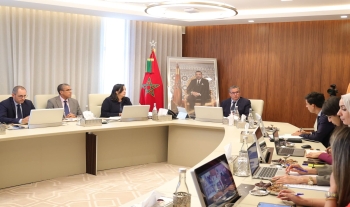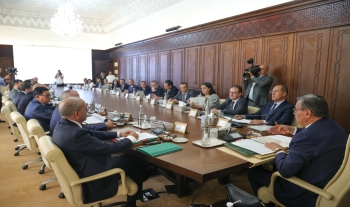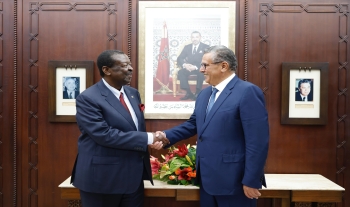The Head of Government launches the April session of social dialogue

The April session of social dialogue was launched on Tuesday, April 22, 2025, in Rabat, under the presidency of the Head of Government, Mr. Aziz Akhannouch, and in the presence of Ms. Nadia Fettah, Minister of Economy and Finance; Mr. Younes Sekkouri, Minister of Economic Inclusion, Small Business, Employment, and Skills; Mr. Fouzi Lekjaa, Minister Delegate to the Minister of Economy and Finance in charge of the Budget; Mr. Mustapha Baitas, Minister Delegate to the Head of Government in charge of Relations with Parliament and Government Spokesperson; and Ms. Amal El Fellah, Minister Delegate to the Head of Government in charge of Digital Transition and Administrative Reform.
The Head of Government presided over separate and fruitful meetings with trade union confederations, beginning with a meeting with a delegation from the Moroccan Labor Union (UMT), led by its Secretary General, Mr. Miloudi Moukharik. This was followed by meetings with a delegation from the General Union of Moroccan Workers (UGTM), led by Secretary General Mr. Enaam Mayara, and with a delegation from the Democratic Confederation of Labor (CDT), led by Mr. Khalid Alami Lahouir, First Deputy Secretary General. A meeting was also held with a delegation from the General Confederation of Moroccan Enterprises (CGEM), led by its President, Mr. Chakib Alj.
These meetings, characterized by a positive atmosphere and responsible, constructive dialogue, emphasized that the government had honored its commitments regarding the implementation of agreements signed with trade unions. The April 2024 session culminated in an agreement on several key points, primarily a general salary increase in the public sector of 1000 dirhams net, distributed in two phases, with the second phase to be implemented in July for the benefit of about one million civil servants. It also included a reduction in income tax (IR) for all employees and civil servants, reaching up to 400 dirhams for middle-income categories. The agreement also covered a 10% increase in the minimum wage in the sectors of industry, commerce, liberal professions (SMIG), and agriculture (SMAG).
Discussions also focused on the completion of outstanding social commitments and addressing challenges related to collective bargaining agreements.
These meetings, which fall within the institutionalization of social dialogue, highlighted the government's commitment to opening category-related files. There was also discussion of issues related to local government sectors, which will be on the agenda of this session, with the aim of finding solutions as quickly as possible in line with the wishes of social partners.
Throughout the various meetings, the commitment to maintaining the participatory approach established at the beginning of the government’s mandate was reaffirmed, particularly concerning the implementation of certain projects and reforms, such as pension system reform. This session of social dialogue provided an opportunity to discuss the methodology for pension reform following the April 2022 agreement, which outlined a set of principles to be respected and called for the revitalization of the national commission responsible for pension reform.
A number of other issues were also addressed in line with the expectations of social and economic partners, notably the amendment of the labor code.
At the conclusion of these meetings, the Head of Government praised the strength of the ties binding the government to its social and economic partners, far beyond any seasonal nature. He affirmed that the government draws its deep conviction about the importance of social dialogue from the High Directives of His Majesty King Mohammed VI, may God assist him, with the goal of realizing the objectives of a social state, improving workers’ conditions, and enhancing the performance of the national economy.
Mr. Aziz Akhannouch recalled in this regard that the government, together with its social and economic partners, has succeeded in concluding unprecedented social agreements, having signed two historic social agreements in the first half of the current mandate, in line with the government’s belief that social dialogue is a strategic option to improve citizens’ purchasing power.







